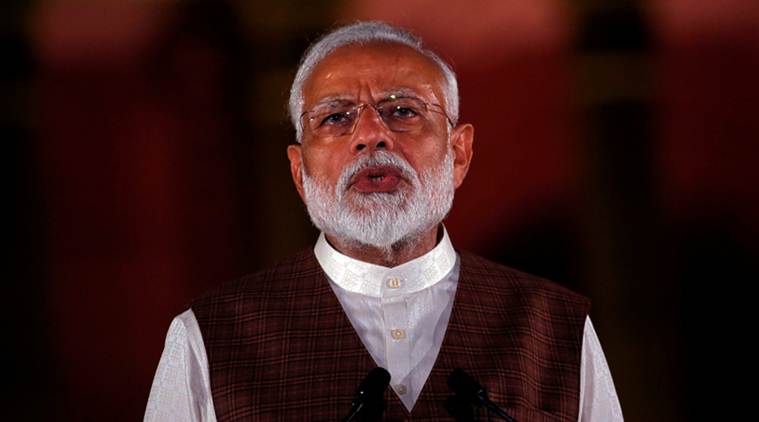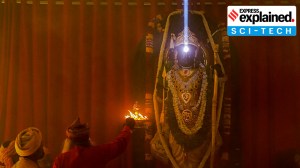- India
- International
Raja Mandala: India and the Sino-Russian alliance
The strengthening of ties between Russia and China present a challenge to Delhi. But it is better prepared than most to play the new Great Game.
 Prime Minister Narendra Modi. (Reuters/File)
Prime Minister Narendra Modi. (Reuters/File)
As Prime Minister Narendra Modi heads this week to the summit of the Shanghai Cooperation Organisation, the media interest is riveted on what might or might not happen between him and Pakistan’s Imran Khan. Modi, though, might have other things at the top of his mind — the unfolding alliance between Russia and China and what it might mean for India’s international relations.
Russian President Vladimir Putin and Chinese leader Xi Jinping are coming to the SCO summit in Bishkek, Kyrgyzstan, after an expansive celebration of their alliance in Moscow and St Petersburg last week. Putin has declared that the partnership with China has risen to “unprecedented levels”. Chinese media is describing the current phase as the “golden age” in relations with Russia.
That the Sino-Russian alliance is being framed as a counter to the United States makes it that much more complicated for Indian diplomacy. Navigating the rivalry between the great powers remains the biggest challenge for India’s foreign policy during Modi’s second term.
During the first term, he could simply build on the possibilities with all the major powers that he had inherited from his predecessors since the end of the Cold War. That period of relative harmony between major powers has ended. Making matters more complicated for India is the fact there is betting on where the triangular dynamic might eventually settle down.
Moscow and Beijing are eager to limit the US influence in what they see as their backyard — inner Eurasia for Russia and the western Pacific for China. They are eager to assist each other’s contestation with America, while limiting the many real contradictions between themselves.

For years, the US policymakers dismissed the prospects for an enduring alliance between Russia and China. They insisted that the convergence between Moscow and Beijing was at best tactical. Many in Washington are wondering if that assessment needs to be revised amidst the tightening strategic embrace between Putin and Xi.
“China and Russia will present a wide variety of economic, political, counterintelligence, military, and diplomatic challenges to the United States and its allies. We anticipate that they will collaborate to counter US objectives,” according to the US intelligence community’s 2019 Worldwide Threat Assessment report presented to the US Senate earlier this year. The report went on to say that China and Russia were “expanding cooperation with each other and through international bodies to shape global rules and standards to their benefit and present a counterweight to the United States and other Western countries”.
In a major development last week, a US warship nearly collided with a Russian naval vessel in the Western Pacific. US officials are surprised by the fact that the Russian navy is willing to confront the US forces near the Chinese waters. It is quite common for Russia to challenge any American naval forays in and near the seas around it.
The latest incident is seen in Washington as a Russian move to support the Chinese naval forces that are locked in an escalating confrontation with the US in the South China Sea and the Western Pacific. Chinese forces too are beginning to turn up in the zones of contestation between Russia and its European neighbours.
Many in the US blame Washington for pushing China and Russia closer, by embarking on simultaneous confrontation with both of them. Although the US’s quarrels with Russia and China began well before Donald Trump’s presidency, they have intensified in the last two years. To be sure, Trump wants to improve ties with Russia, but the domestic political dynamic in Washington centred on Moscow’s alleged interference in the 2016 elections has limited his room for manoeuvre on Russia.
The US, however, may have its own reasons in believing that it can take on Russia and China at the same time. Trump is aware that both Putin and Xi are very eager for their own separate deals with the US and that he can change the triangular dynamic at will. In any event, Trump is not only driving America’s potential adversaries towards each other, but is also challenging Washington’s long-standing allies in Europe and Asia.
The US is quite clearly reformatting its foreign policy basics under Trump. India is in a very different situation. As the weakest of the major powers, Delhi is far more sensitive to any realignments among great powers. Further, Delhi has a longer memory of the Sino-Russian relationship than most other nations — of the “Red alliance” between Russian and Chinese communists in the 1950s, their breakup in the 1960s, their confrontation in the 1970s and the rapprochement since the late 1980s.
Like Washington, Delhi too might have underestimated the prospects for a deeper alliance between Moscow and Beijing. Delhi can no longer make light of the implications of the emerging Sino-Russian alliance for India’s engagement with other powers, especially the US, and the regional consequences for India’s neighbourhood, especially the Af-Pak region.
But there is little reason for panic. Modi arrives for his meetings with Putin and Xi as a stronger leader after the elections. He is conscious of India’s own limited but not insignificant leverages. As his foreign minister S Jaishankar put it the other day, “in every clash, there is an opportunity”. The policy challenge, according to Jaishankar, is to “manage the risks and maximise the opportunities”. Delhi appears better prepared than most capitals to play the new Great Game between Russia, China and America.
The writer is director, Institute of South Asian Studies, National University of Singapore and contributing editor on international affairs for The Indian Express
40 Years Ago
EXPRESS OPINION
Best of Express
Apr 18: Latest News
- 01
- 02
- 03
- 04
- 05









































